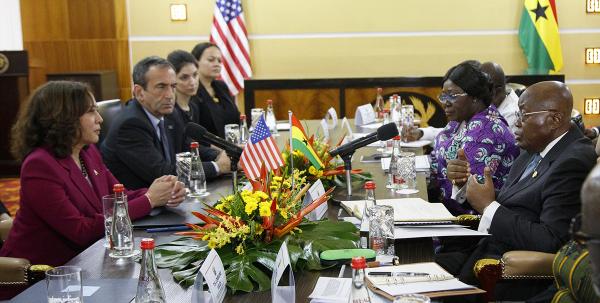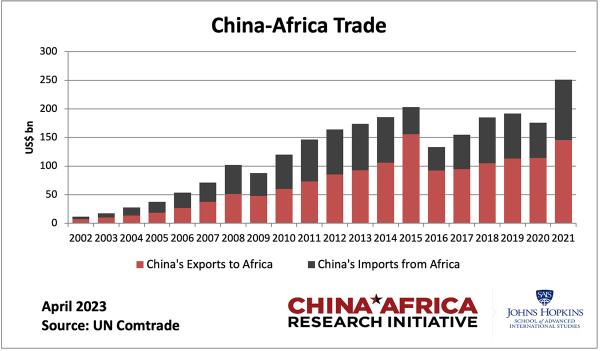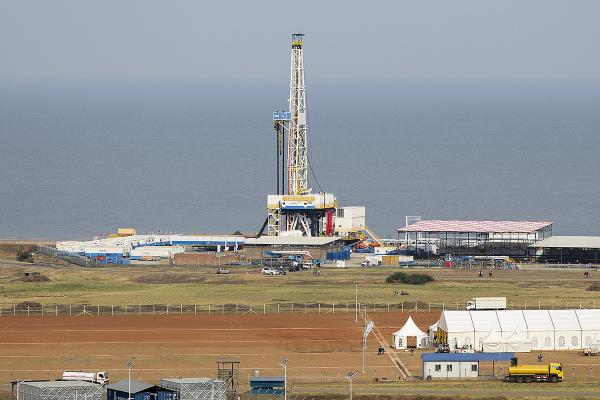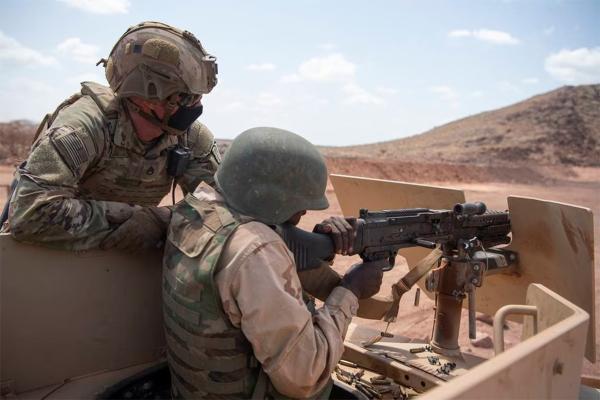For over a year, the U.S. has been waging a full-court press—diplomatic, economic, political and military—to regain lost influence on the African continent. In the latest installment, Vice President Kamala Harris recently visited three major African nations—Ghana, Zambia and Tanzania. A New York Times podcast described it as a U.S. “charm offensive.”
For much of this, Harris acted like she was just an ordinary Black woman, proud and excited to be visiting her ancestral homeland, spreading good vibes and good will. She told stories about her childhood trip to Zambia to visit her grandfather. She gushed to young artists that “The creative work that is happening on this continent, as represented by the work happening in Ghana, is extraordinary.” Harris posted her Spotify list of her favorite African music.
But interspersed with this were solemn warnings about “predatory” China, and pledges of aid, scholarships and investment to draw African rulers and people to see that the U.S. was their “true friend” that they should ally with.
Because, in fact, Kamala Harris is not an ordinary Black woman, nor is she some kind of “emissary” from the Black diaspora.
To the contrary, Harris is a top leader and loyal representative of an empire whose very roots were nourished by the blood and sweat of millions of African people kidnapped and enslaved, and which has exploited, degraded, imprisoned and murdered Black people on a mass scale ever since.

Kamala Harris at conference table with Ghanian politicians, March 2023.
Harris is an emissary, yes—of an empire that was neck deep in the 20th century plunder of African people and resources, and the violent suppression of anyone who resisted this. She speaks for U.S. imperialism, which plotted to murder or overthrow progressive African leaders like Patrice Lumumba (in what is now the Democratic Republic of Congo) and Kwame Nkrumah in Ghana. An empire that backed the vicious apartheid regime in South Africa for decades. And that backed truly monstrous counter-revolutionary groups like RENAMO in Mozambique and UNITA in Angola, leaving tens or even hundreds of thousands of civilians dead or crippled in their wake.
All this was part of the U.S. imperialists' worldwide struggle with their main rival at that time—the imperialist Soviet Union (now Russia)—as well as to crush movements towards genuine liberation. All this, along with the atrocities of the other Western colonial powers that conquered, ruled and plundered the continent for centuries—France, Britain, Germany and Portugal—exacted an almost unimaginable cost in suffering and death, and deeply damaged the land, peoples and societies in fundamental ways.
And right now—again—the U.S. empire is engaged in a major struggle for world domination with its emerging rival, China1, as well as its longtime foe, Russia2, with great potential to erupt into a world war.
And Africa is increasingly seen as a crucial arena in this contention.
After the Russian invasion of Ukraine (which quickly turned into a proxy war between the U.S./NATO and Russia over Ukraine) the UN General Assembly voted on a resolution to condemn Russia. The U.S. expected overwhelming support, but half of the African countries either abstained or didn’t vote!
A Rude Awakening and…
This was a rude awakening for U.S. imperialism. Although it was well-known (and concerning to U.S. rulers) that China had been investing heavily and building up political influence in Africa for several decades, the U.S. rulers were suddenly confronted with the fact that they had, to a significant degree, “lost control” of an entire continent!

Economically, China is now Africa’s biggest trading partner, to the tune of $254 billion in 2021—four times as much as the U.S. China has also been investing massively in infrastructure—highways, railroads, airports, dams, ports—throughout Africa. These projects are built with loans from China—which of course must be paid back over time, making them “good investments” for Chinese capitalism. And they also facilitate further exploitation of people and resources in these countries, especially in the rural interior regions.
But beyond that, they build up political “capital”—tying governments closer to China and creating favorable sentiment among sections of the people. And this is all the more potent because of the long history of Western colonialism and imperialism ravaging Africa, which still leaves a very bitter taste in the mouths of millions.
In addition, China has been investing heavily in extracting Africa’s vast mineral wealth. According to the Brookings Institute the Democratic Republic of Congo (DRC) alone has $24 trillion in untapped mineral resources. In particular, DRC has most of the world’s deposits of a number of metals like cobalt and lithium. DRC is estimated to have 70 percent of the known deposits of cobalt. Fifteen of the 19 primary cobalt mining companies there are Chinese owned, and China processes about 80 percent of the world’s cobalt.

In Uganda, the drilling rig of the Kingfisher oil field, operated by China National Offshore Oil Corporation, January 24, 2023. Photo: AP
Cobalt is crucial to modern batteries—those that power cell phones but also those that power electric cars, which is a major “growth industry” promising enormous levels of profit. Whoever controls the cobalt can cheapen the cost of the cars they produce, giving them higher profits and a major competitive edge over rivals. They could even potentially cut off supplies of cobalt, severely disrupting industries in other countries.
But cobalt is also crucial to military production. It is used for “temperature-resistant alloys for jet engines, in magnets—used for things like stealth technology and electronic warfare—and alloys used in munitions.” 3

Nairobi, Kenya: 17-mile China constructed road. Photo: Twitter
So this whole picture of growing Chinese political influence, and Chinese control over vital economic and military inputs, along with Russian military activity and the crumbling of France (a close ally of the U.S.) in parts of Africa, have increasingly set off alarms in the U.S. ruling class. A U.S. Army general in charge of key forces operating in Africa said in October 2022:
As the Army refocuses on China—our pacing challenge—as well as the acute threat posed by Russia, it’s important to recognize that both countries are actively competing in Africa.… China and Russia understand very well Africa’s strategic significance. They are seeking to influence events on the continent in their favor using political influence, disinformation, economic leverage and malign military activity.
...A Full-Court Press: Diplomatic, Economic, Political and Military
In response, the U.S. rulers have unleashed a full-court press to undercut China’s influence in Africa.4 Since November 2021, Secretary of State Antony Blinken has made at least three trips to Africa, visiting eight countries. And in just the last few months, Secretary of the Treasury Janet Yellen, Dr. Jill Biden, and U.S. Ambassador to the UN Linda Thomas-Greenfield, and Kamala Harris travelled to a total of 11 African countries. President Biden is also expected to go to Africa this year. And in December 2022, the U.S. held a conference in Washington with representatives from 50 African countries.
In addition to these “diplomatic” efforts there have been CIA-style campaigns waged around key countries. For instance, the New York Times reported in November 2021 that more or less out of the blue, “Congolese officials are carrying out a broad review of past mining contracts, work they are doing with financial help from the American government.” [Emphasis added.] Allegations also “emerged” that the Chinese firm, China Molybdenum, wasn’t paying all the royalties it owned to the DRC government. This led to threats to expel the Chinese company from DRC. But in the end DRC and China ended up renegotiating their original deal and renewing Chinese operations. Now, the U.S. is trying to set up a cobalt processing company in Zambia (which borders the DRC, and is closer to the U.S.) so that at least some of DRC’s cobalt would be within U.S. “reach.”
Then on top of that are military operations. DefenseNews.com reported in October 2022 that “The U.S. Army’s 2nd Security Force Assistance Brigade is training militaries throughout Africa to woo countries away from Chinese and Russian influence on the continent,” and that it “has turned largely toward great power competition as it bolsters U.S. military ties in Africa.… The Army hopes the 2nd SFAB can ultimately help integrate African partners with NATO forces.” NOTE: “integrate with NATO” means making African militaries part of the NATO military alliance, even if they don’t formally become NATO members. And DefenseNews.com also says that “the brigade has conducted activities in more than 15 countries across the continent with a regular presence in 11 of them” and that this included helping “Ghanaian forces to shut down an illegal Chinese mining operation.” So with the world on a hair trigger, U.S. troops in Africa are “enabling” military attacks on Chinese nationals!

U.S. Army soldier training a soldier in Djibouti, a small country on the northeast coast of Africa, on October 28, 2020. Photo: USAF
The “Logic” of “Inclusion” vs. the Need for Real Revolution
The logic of identity politics, “inclusion,” etc. is that if more women and people of color were in powerful positions, then the needs of oppressed people would get fairer treatment. In that fantasy-vision, Harris’s election as VP was a huge advance.
But what is the reality of the role that she (or other such “inclusive” figures) play? As seen in this Africa trip, (as well as her role in immigration policy), people like this serve to front for and sugarcoat the most grotesque crimes of the imperialist system, particularly because of their ability to get over on the oppressed themselves. And in this case, it is about attempting to line people up on the side of the greatest oppressors to fight a potentially world-ending war against their rival oppressors. Thanks Kamala!
Real liberation requires many things (see revcom.us and The RNL Show). But an absolute precondition is that people recognize that it is the system of capitalism-imperialism—and not the race/gender/background, etc. of any or all that system’s leaders—that is responsible for the immense, mounting and immeasurable suffering in the world. And that overthrowing that system—and not “working within it to make it better”—should be the goal of everyone with a shred of decency.